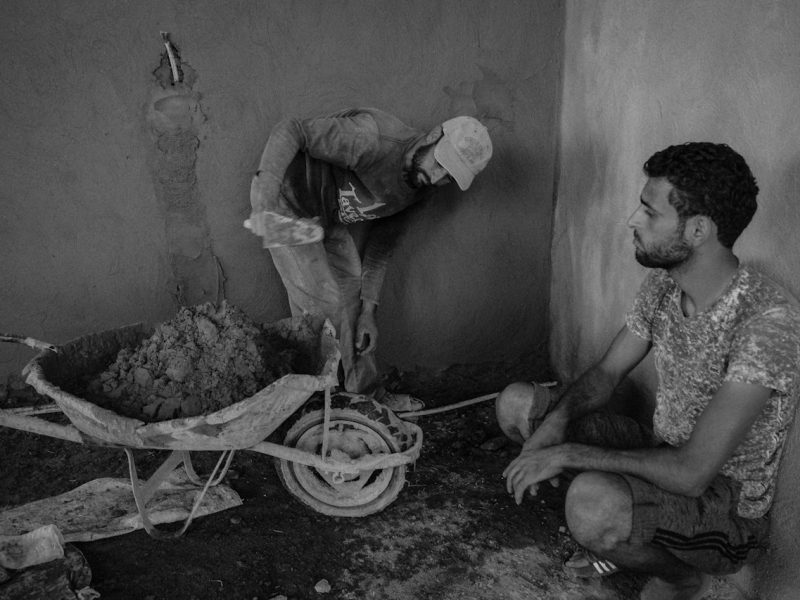[…]
For its part, the international community and its agencies are called to give a voice
to those who have none. Among the latter in our own time, I would mention the
victims of other ongoing wars, especially that in Syria with its high death toll. Once
more, I appeal to the international community to promote a political solution to a
conflict that will ultimately see only a series of defeats. It is vital to put an end to
violations of humanitarian law, which cause untold suffering to the civil population,
especially women and children, and strike at essential structures such as hospitals,
schools and refugee camps, as well as religious edifices.
Nor can we forget the many displaced persons resulting from the conflict; this has
created great hardship for neighbouring countries. Once more, I express my gratitude
to Jordan and Lebanon for receiving in a spirit of fraternity, and not without
considerable sacrifice, great numbers of people. At the same time, I express my hope
that the refugees will be able to return to their homelands in safe and dignified living
conditions. My thoughts also go to the various European countries that have
generously offered hospitality to those in difficulty and danger.
Among those affected by the instability that for years has marked the Middle East
are especially the Christian communities that have dwelt in those lands from apostolic
times, and down the centuries have contributed to their growth and development. It
is extremely important that Christians have a place in the future of the region, and
so I encourage all those who have sought refuge in other places to do everything
possible to return to their homes and in any event to maintain and strengthen their
ties to their communities of origin. At the same time, I express my hope that political
authorities will not fail to ensure their security and all else needed for them to
continue to dwell in the countries of which they are full citizens, and to contribute to
their growth.
Sadly, in these years Syria and more generally the whole Middle East have become
a battleground for many conflicting interests. In addition to those of a chiefly political
and military nature, we should not overlook attempts to foment hostility between
Muslims and Christians. Even though “over the centuries many quarrels and
dissensions have arisen between Christians and Muslims”,[7] in different areas of the
Middle East they have long lived together in peace. In the near future, I will have
occasion to visit two predominantly Muslim countries, Morocco and the United Arab
Emirates. These represent two important opportunities to advance interreligious
dialogue and mutual understanding between the followers of both religions, in this
year that marks the eight-hundredth anniversary of the historic meeting between
Saint Francis of Assisi and Sultan al-Malik al-Kāmil.
Among the vulnerable of our time that the international community is called to defend
are not only refugees but also migrants. Once again, I appeal to governments to
provide assistance to all those forced to emigrate on account of the scourge of
poverty and various forms of violence and persecution, as well as natural
catastrophes and climatic disturbances, and to facilitate measures aimed at
permitting their social integration in the receiving countries. Efforts also need to be
made to prevent individuals from being constrained to abandon their families and
countries, and to allow them to return safely and with full respect for their dignity
and human rights. All human beings long for a better and more prosperous life, and
the challenge of migration cannot be met with a mindset of violence and indifference,
nor by offering merely partial solutions.
Consequently, I cannot fail to express my appreciation for the efforts of all those
governments and institutions that, moved by a generous sense of solidarity and
Christian charity, cooperate in a spirit of fraternity for the benefit of migrants. Among
these, I would like to mention Colombia that, together with other countries of the
continent, has welcomed in recent months a vast influx of people coming from
Venezuela. At the same time, I realize that the waves of migration in recent years
have caused diffidence and concern among people in many countries, particularly in
Europe and North America, and this has led various governments to severely restrict
the number of new entries, even of those in transit. Nonetheless, I do not believe
that partial solutions can exist for so universal an issue. Recent events have shown
the need for a common, concerted response by all countries, without exception and
with respect for every legitimate aspiration, whether of states or of migrants and
refugees themselves.
In this regard, the Holy See has actively participated in the negotiations and
supported the adoption of the two Global Compacts onRefugees and on Safe, Orderly
and Regular Migration. In particular, the migration Compact represents an important
step forward for the international community, which now, in the context of the United
Nations is for the first time dealing on a multilateral level with this theme in a
document of such importance. Despite the fact that they are not legally binding, and
that some governments were absent from the recent United Nations Conference in
Marrakesh, these two Compacts will serve as important points of reference for
political commitment and concrete action on the part of international organizations,
legislators and politicians, as well as all those working for a more responsible,
coordinated and safe management of situations involving refugees and migrants of
various kinds. In the case of both Compacts, the Holy See appreciates their intention
and their character, which facilitates their implementation; at the same time, it has
expressed reservations regarding the documents appealed to by the Compact on
migration that contain terminology and guidelines inconsistent with its own principles
on life and on the rights of persons.




